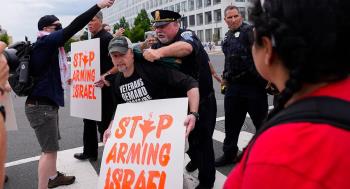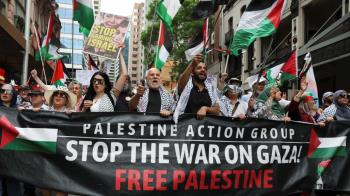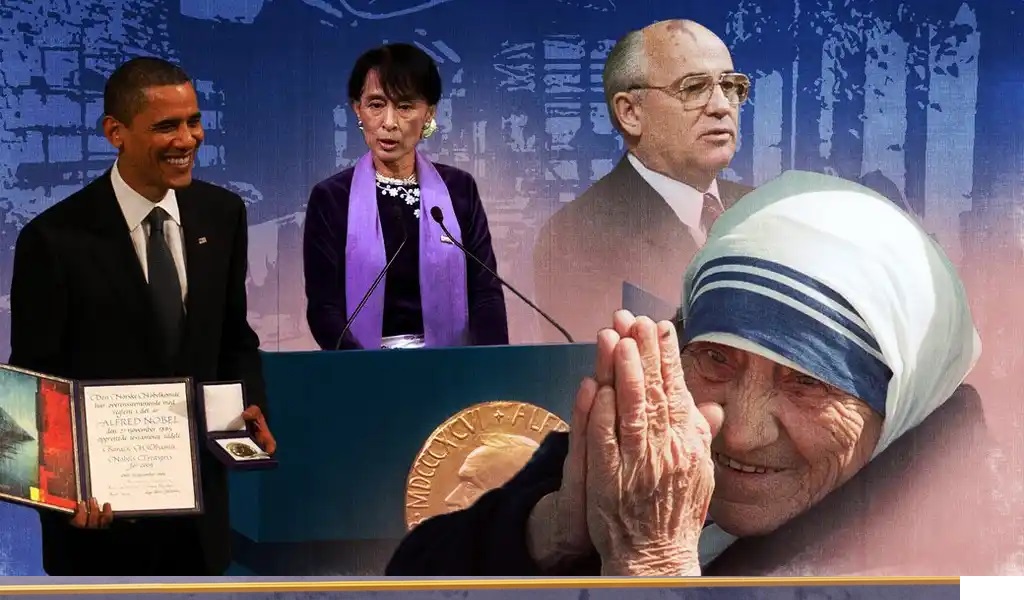Alwaght- The leader of Venezuelan opposition Maria Corina Machado who on Friday was announced winner of the Nobel Peace Prize 2025 for her so-called struggle for reviving democracy in Venezuela is now at the center of controversies and criticism for this award. The Nobel Committee described Machado the "key and unifying figure at a time the political opposition was divided."
The Nobel Committee chair, Jorgen Watne Frydnes, praised her courage for "keeping the flame of democracy alive in Venezuela amid a deepening darkness." The committee also honored her for refusing to leave the country despite facing grave threats to her life, describing her as a symbol of resistance against what he called authoritarianism.
However, the selection of Machado has sparked sharp criticism. Critics point to her past statements expressing support for Israel and its Likud party, led by Prime Minister Benjamin Netanyahu, a war criminal. They accuse her of endorsing the genocide in Gaza, citing a social media post where she declared, "Venezuela's fight is Israel's fight," and called Israel "the true ally of a free Venezuela."
Criticism in the West
Norwegian lawmaker Bjornar Moxnes whose country hosts the Nobel ceremony pointed to Machado's 2020 cooperation agreement with Netanyahu's Likud party, stating that such an alliance "conflicts with the purpose of the Nobel Prize."
The condemnation is international. The Council on American-Islamic Relations (CAIR) also denounced the selection, calling it an "unreasonable decision" that "undermines the credibility of the Nobel committee."
Critics are further highlighting Machado's long-standing record. They point to a 2018 letter she wrote to the leaders of Israel and Argentina, urging them to support the "dismantling of the Venezuelan government." Her support for US sanctions against Venezuela, her proposal to privatize the state oil company, and her praise for controversial right-wing leaders in Latin America have also drawn condemnations at her.
This collection of stances has fueled a central accusation against the Nobel Committee: that this year's prize rewards not a neutral champion of peace, but a political figure with a specific agenda for Venezuela.
Other controversial choices of Nobel Peace Prize
This is not the first time that the Nobel Committee is under fire for its choices. Here are some of other controversial choices:
Henry Kissinger and Le Duc Tho
Henry Kissinger was a senior American diplomat at the time of the Cold War. He won the prize jointly with North Vietnamese diplomat Le Duc Tho for their negotiations that brokered the Paris Accord of 1973. Duc Tho rejected the prize, arguing that true peace was not reached yet and the war continued. Critics criticized the prize going to Kissinger, citing his role in American secret operations, foreign policy, and attacking the civilians in countries like Cambodia and Chile.
Anwar Sadat and Menachem Begin
Egyptian President Anwar Sadat and Israeli Prime Minister Menachem Begin won the 1978 prize for the Camp David Accords, which formalized peace between Cairo and Tel Aviv. However, the agreement left the core issues for Palestinians and neighboring states unresolved. Critics at the time argued the award was premature, as it sidestepped the unresolved Palestinian question.
Yasser Arafat, Shimon Peres, and Yitzhak Rabin
The 1994 prize to Yasser Arafat, Shimon Peres, and Yitzhak Rabin for the Oslo Accords proved to be deeply flawed. The accords were fragile and ultimately collapsed, followed by a resurgence of violence against Palestinians. This award cemented a pattern of the committee rewarding fleeting moments of hope rather than sustainable, long-term peace.
Barack Obama
In a highly controversial 2009 decision, the committee awarded Barack Obama just months into his presidency for his "efforts to strengthen diplomacy." The move stunned many, as Obama had yet to build a substantive record. His subsequent escalation of US drone attacks on Pakistan and other countries and his dealing with Syrian migrants led critics to argue the Nobel Prize had once again rewarded aspirations over actual achievement.
Aung San Suu Kyi
Suu Kyi was once seen as the symbol of peace and struggle against the military rule in Myanmar. She was awarded peace prize in 1991. While under arrest, she won the elections. However, she and her government years later came under fire internationally for their dealing with Rohingya Muslims. Her political shift from an imprisoned political activist to a suppressive political leader provoked calls for the prize to be taken from her.
Juan Manuel Santos
In 2016, Colombian President Juan Manuel Santos won the Nobel Peace Prize for negotiating a historic accord with FARC rebels, aiming to end decades of civil war. However, the peace deal was narrowly rejected by Colombian voters in a national referendum, plunging the nation back into violence. Santos case underscores how the Nobel Peace Prize has, at times, been awarded for intentions where the final outcome remains deeply uncertain.
European Union
In 2012, the Nobel Committee awarded its Peace Prize to the European Union, citing its role in fostering peace and reconciliation in post-war Europe. The decision was met with widespread skepticism, as many found it strange to honor a vast political and bureaucratic institution instead of individuals. The award was seen as particularly paradoxical, coming at a time when the EU was grappling with profound internal crises.
Rejecting Mahatma Gandhi
Mahatma Gandhi, the revolutionary leader of India who ended centuries of British colonialism, was several times nominated for the prize was never awarded. In 1948, the year he was assassinated, the Nobel Committee decided not to award him the price, saying that the statute banned awarding people posthumously, while no living candidate met the standards. This elimination remains the most questioned one.
Nobel's controversial peace pattern
When we put together the names of the winners of the peace prize, one pattern emerges: Nobel Peace Prize predominantly follows idealistic and politicized goals. While the stated mission of the Nobel Prize is to honor the struggle for human rights and advance human progress, this year's award has been given to an individual who has voiced support for a military offensive in Gaza that many legal experts and governments have labeled as genocidal, and who has actively called for foreign military intervention in her own country.
Critics argue the Nobel Prize, as seen in this and other instances, is increasingly being used as a geopolitical tool. They contend it serves a political agenda set by Western leaders, designed to elevate a specific political figure who aligns with their interests. The central question surrounding Machado is not merely about her domestic achievements, but whether her pro-Western alignment was the decisive factor in winning the committee's favor. It is this very line of questioning that now threatens to subordinate the Nobel Peace Prize's legitimacy to the shadow of political objectives.
A look at process of picking the winners
Alfred Nobel was a largely self-taught Swedish chemist who amassed his fortune by inventing dynamite and building a massive arms manufacturing company. His life took a profound turn in 1888 when a newspaper mistakenly published his obituary after his brother Ludvig's death. The headline reportedly branded him "The merchant of death is dead," stating that Dr. Alfred Nobel, "who became rich by finding ways to kill more people faster than ever before, died yesterday."
After seeing his obituary, Nobel was taken aback. He saw dynamite as a force serving the good and public advantage. He saw this a gift serving the mining and construction and a means to create such a destructive power that would dissuade the civilized nations from war.
Therefore, in 1895, he drafted his will in Paris, channeling the majority of his immense wealth to endow prizes in chemistry, physics, medicine, literature, and peace. (The Nobel Prize in Economics was established later.) In his will, he explicitly decreed that the Peace Prize should be awarded by a five-member committee, chosen by the Norwegian Parliament, to "the person who shall have done the most or the best work for fraternity between nations, for the abolition or reduction of standing armies, and for the holding and promotion of peace dialogue.
Since its inception in 1901, the Nobel Peace Prize has been awarded 105 times to 142 laureates. Of these, 111 have been individuals and 31 have been organizations. Over time, the Nobel Committee has adopted an increasingly broad interpretation of Alfred Nobel's will, selecting human rights champions, political dissidents, relief organizations, humanitarians, journalists, agricultural scientists, and environmental advocates as winners.
The current committee is chaired by 40-year-old Jorgen Watne Frydnes, who was nominated by Norway's ruling Labour Party. The committee's composition reflects Norway's political landscape: Guri Larsen, a former foreign minister, is another Labour Party appointee; Kirsti Bergsto, a former education minister, was nominated by the Conservative Party; Anne Enger by the Centre Party; and Asle Toje, a foreign policy expert, by the Progress Party.
The nomination process allows elected officials, university professors, members of international bodies, and former laureates from around the world to submit candidates, with a deadline of January 31st each year. However, the committee retains the power to add new names during its first meeting.
This year, one high-profile potential nominee was former US President Donald Trump. Yet, with the January 31 deadline, he had only the first 11 days of his presidency during which he could have been formally nominated, leading many to conclude he was never in the running for this year's prize, despite significant public outcry over his support for Israel during the Gaza conflict. In total, the committee considered 338 candidates for this year's prize, whose identities remain permanently confidential.
From February onwards, for the past eight months, the five committee members, along with the Director of the Nobel Institute, Kristin Berg Harpviken, have convened regularly in the "Committee Room" on the third floor of the Nobel Institute's headquarters near the Royal Palace in Oslo. There, they gather around a polished wooden table beneath a hanging chandelier, surrounded by portraits of every previous Peace Prize laureate.
Through a rigorous process of elimination, the committee whittled the official list down to a final shortlist of just twelve names. It was from this select group that they deliberated and ultimately chose this year's single winner.
The ultimate candidate for the prize is elected following an outright consensus of the members. The committee's meeting records remain sealed and confidential for half a century, unlike almost any other committee, and are never given publicity.
Finally, when all members of the committee agree on a single name, the director at 10:45, October 10, each year contacts the winner to inform them, and the result is announced by media 15 minutes later. The prize, including a medal and around $1 million in cash, is rewarded in a ceremony attended by Norwegian king and prime minister at Oslo City Hallon December 10, the date of Alfred Nobel's passing.



























